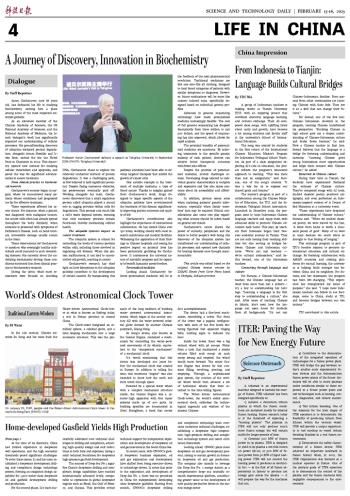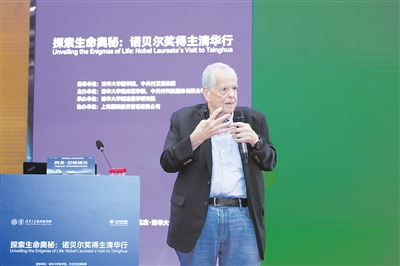
 |
| Professor Aaron Ciechanover delivers a speech at Tsinghua University in September 2024. (PHOTO: Tsinghua University) |
Aaron Ciechanover, now 88 years old, has dedicated his life to studying biochemistry, earning him a place among some of the most respected scientists globally.
As an esteemed member of the Chinese Academy of Sciences, the US National Academy of Sciences, and the National Academy of Medicine, the Israeli biologist's work has significantly impacted our understanding of cellular processes. His groundbreaking discovery of ubiquitin-mediated protein degradation, alongside Avram Hershko and Irwin Rose, earned the trio the Nobel Prize in Chemistry in 2004. This discovery opened new avenues for studying cellular metabolism and apoptosis, and paved the way for significant advancements in cancer treatment.
From clinical practice to biochemical research
Ciechanover's journey began in surgery, where he encountered many patients whose conditions had progressed too far for effective treatment.
These experiences affected his career choice. For instance, when a patient was diagnosed with malignant tumors, the cancer cells often had already spread throughout the body. Similarly, when someone is presented with symptoms of Parkinson's Disease, such as hand tremors, irreversible damage usually occurs in the brain.
These observations led Ciechanover to question why seemingly healthy individuals could succumb to such devastating diseases. His curiosity about the underlying mechanisms driving these conditions motivated him from clinical practice to biochemistry research.
During the 1970s, while most researchers were focused on decoding DNA, Ciechanover chose to explore the relatively uncharted territory of protein degradation. It was a challenging path, as few believed it held significant potential. Despite facing numerous obstacles, his perseverance eventually paid off. Working alongside his team, Ciechanover discovered that a small regulatory protein called ubiquitin played a crucial role in tagging proteins within cells for degradation. This process acts much like a cell's waste disposal system, ensuring that only necessary proteins remain functional, thereby maintaining cellular health.
The ubiquitin system's impact on cancer treatment
The ubiquitin system is critical for controlling the levels of various proteins within cells, including those involved in regulating cell division. When this system malfunctions, it can lead to uncontrolled cell growth, resulting in cancer.
Ciechanover's research has shed light on how disruptions in the ubiquitin pathway contribute to the development of certain cancers. By manipulating this pathway, scientists have been able to develop targeted therapies that inhibit the growth of cancer cells.
One notable example is the treatment of multiple myeloma, a type of blood cancer. Thanks to insights gained from Ciechanover's work, drugs designed to target specific aspects of the ubiquitin pathway have revolutionized the treatment of this disease, significantly improving patient outcomes and quality of life.
Ciechanover's contributions also highlight the importance of international collaboration. He has visited China over 150 times, working closely with local research institutions and medical facilities. Witnessing the application of their findings in Chinese hospitals and seeing the positive impact on patients' lives has been particularly gratifying for Ciechanover. It underscores the universal nature of scientific progress and its capacity to benefit humanity across borders.
Personalized medicine
Looking ahead, Ciechanover believes personalized medicine will be at the forefront of the next pharmaceutical revolution. Traditional medicines are like one-size-fits-all clothing, designed to treat broad categories of patients with similar symptoms or diagnoses. However, future medications will be more like custom-tailored suits, specifically designed based on individual genetic profiles.
Advances in genome sequencing technology have made personalized medicine increasingly feasible. The cost of full genome sequencing has dropped dramatically from three million to just 500 dollars, and the speed of sequencing has also improved, which allows for rapid analysis.
The potential benefits of personalized medicine are enormous. By tailoring treatments to the specific genetic makeup of each patient, doctors can achieve better therapeutic outcomes with fewer side effects.
Despite the promise of personalized medicine, several challenges remain. Developing drugs tailored to individual genetic characteristics is complex and expensive and this also raises concerns about its accessibility and affordability.
In addition, privacy issues arise when analyzing patients' genetic information, especially when family members' data may be required. Ethical considerations also come into play regarding what actions should be taken based on genetic test results.
Ciechanover's career shows the power of curiosity, persistence and the desire to better people's well-being. His discovery of the ubiquitin system has transformed our understanding of cellular processes and opened new channels for treating diseases once thought insurmountable.
This article was edited based on the original Chinese version written by ZHANG Xinxin from Cover News based in Chengdu, Sichuan province.







